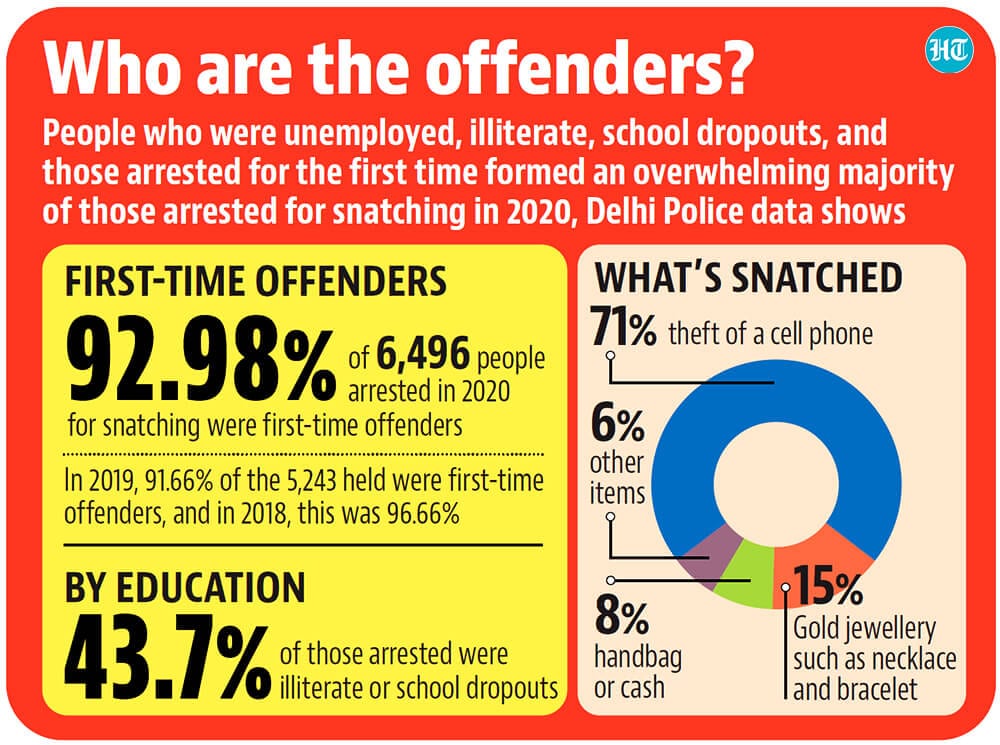Snatching Delhi’s main gateway crime: Data
An HT analysis of the profile of snatchers arrested in Delhi between 2018 and 2020 shows that more than 90% of those arrested were caught for the first time, and did not have any criminal record until then. Police registered them as “first-time offenders”.
Unemployed, illiterate, school drop-outs, arrested for the first time – these are common threads that connect almost every person arrested for snatching in Delhi since 2018, highlighting how one of the most serious concerns on the streets of the national capital is also its biggest gateway crime.

An HT analysis of the profile of snatchers arrested in Delhi between 2018 and 2020 shows that more than 90% of those arrested were caught for the first time, and did not have any criminal record until then. Police registered them as “first-time offenders”.
Of the 6,496 people arrested in 2020, at least 5,977 (92.98%) were first-time offenders. In 2019, of the 5,243 arrested, this number was 4,806 (91.66%), and in 2018, 5,167 out of the 5,346 people (96.66%) arrested for snatching had no past record.
Snatching has come sharply under the spotlight after a woman was last week stabbed to death in north Delhi’s Adarsh Nagar even as she held her two-year-old daughter in her arms while trying to defend herself against snatchers. The two men arrested for the crime — Fardeen,19, and Aqibul, 22 — were unemployed, school drop-outs, and like the majority of Delhi’s snatchers, had never been arrested before.
“This is what makes snatching so difficult to control. Any person on the road could be a snatcher in Delhi — he need not be a hardcore criminal. Numerous cases of first-timers indulging in this crime shows how this is the first offence that one commits before entering the world of crime,” said a senior police officer who asked not to be named.
It was a view that several other present and former cops agreed with.
Citing an example of how several young men who turn to crime because of trying circumstances start by becoming snatchers, the officer cited above said at least 100 people arrested last year said that they had turned to snatching after losing their jobs during the Covid-19 pandemic. “The situation is that a person loses his job and finds snatching as the second-best option to make a living. In October, we arrested a man named Mohsin, who worked in a shoe store but lost his job during the lockdown. He then got in touch with his two friends and tried to snatch a man’s phone outside Red Fort. The examples are too many. There are no records of such persons,” a second officer said. Explaining the difficulties in keeping track of such people, a third senior officer said: “It is easier to keep tabs on hardcore criminals and their gangs. Their activities and areas of operation are known; we can place informers. But many young men who are snatchers manage to slip through the net because they don’t have a record. It takes a concerted effort to bring down snatching cases.”
Though snatching cases in Delhi rose in 2020 as compared to 2019 — 7965 as compared to 6266 — the third officer said that distress calls to the Police Control Room number, 112, was a better indicator of mapping the crime. The calls are a part of the record and cannot be removed from the log. According to police’s crime data, in 2020 there were 24,746 snatching calls, compared to 56,937 in 2019. However, the calls do not mean number of incidents, as the same victim could have made multiple calls; and victims sometimes refer to “theft” as “snatching”. The difference between the two, in police parlance, is that there is use of force in snatching.
Further analysis of police data shows that of the snatchers arrested in 2020, almost 43.71% (2,840) were illiterate or school drop-outs (did not clear Class 5). In fact, only 10 of the arrested had graduate degrees.
The data also showed that a cell phone was the most common item snatched — in at least 71% (5,655) of the cases — followed by gold jewellery such as necklace and bracelet in at least 15% cases (1,195) and a handbag or cash in at least 8% of the cases (638).
EASY MONEY
Advocate LN RAO, who worked in Delhi Police for over three decades and retired as a deputy commissioner of police of the Special Cell, said snatching has become rampant because it’s relatively easy and offers instant returns.
“Disposing of a snatched cell phone or a piece of gold jewellery is not a problem. An unemployed person vulnerable towards crime has realised that there is no dearth of buyers for such stolen items. It may be difficult to dispose a stolen car but this is not the case with cell phones or gold jewellery. With prices of cell phones and gold increasing regularly, the unemployed person, who has stolen those items, gets a good return,” he said.
Rao said that a cell phone, which costs ₹30,000 could be sold at half its price, and a gold jewellery once stolen could be melted within minutes, removing all evidence of the crime.
Another expert, Vikram Singh, who was a former director-general of the Uttar Pradesh police, said, “Incidents happening in many parts of the city show that the snatchers do not fear the police in Delhi. Police must hit back. I mean, hit hard. If snatchers are striking in different parts of the city, it means police are unable to create fear in the minds of the snatchers. Snatchers should know that if they indulge in any trick, the police will make them pay. Police should work towards that.”
Delhi’s deputy commissioner of police of the crime branch, Chinmoy Biswal, who is also the police spokesperson, said, “ Our cases show that many juveniles are indulging in snatching. We cannot maintain their record. Many times, when they are caught, we find that they have a history of such crimes but there is no such record. Maintaining surveillance then becomes difficult. There are many first-time offenders too. Though it is not part of core policing, every year we identify youths, who could deviate towards crime if given an opportunity. As part of our YUVA programme, we helped thousands of such youths find jobs so that they can be weaned away from the wrong path. At times, there are some incidents but we have launched a massive crack down on snatching and all other crimes.The numbers of snatching calls have reducedwhile the number of arrested persons has increased.”
LAWS NOT STRINGENT
Former additional commissioner of police, Ashok Chand, said the current laws were too lenient towards a heinous crime that can even lead to serious injuries or deaths. “The law has to be made stricter. Those vulnerable towards crime may be indulging in snatching because they know that they will get bail easily. Amending the law like the one in Haryana will put some rein on the snatchers.”
In Delhi, there is no specific law related to snatching. Police arrest and book snatchers under Sections 379 (theft) and 356 (criminal force during theft). The maximum punishment, if convicted under the two sections, is three years. In contrast, Haryana has amended the laws and now book snatchers under Section 379A (snatching without use of force) and 379 B (with use of force). If a person is booked under these two sections, the maximum punishment is 10 years and 15 years respectively.
LN Rao agreed that snatching cases will decrease if there is fear of the law.
“It will go down the day a snatcher realises that the offence is non-bailable, that he can end up spending more than 10 years if caught. Until then, such would-be criminals will find snatching as an easy route,” said Rao.





